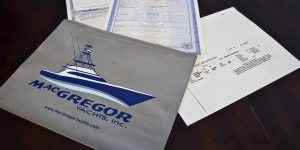Navigating what types of paperwork are needed for your vessel can be challenging, but it doesn’t have to be. It is important to understand the differences between documenting a vessel with the United States Coast Guard and titling a vessel with your state in order to choose the option that is best for your boat and lifestyle. No matter the size of the boat, registration should be completed in a timely manner upon purchasing the vessel. In this article, we’ll break down the major differences between both of these important processes.
USCG Documentation
Documentation
Any vessel that is 5 net tons or greater can be documented with U.S. Coast Guard (USCG). When a vessel is documented, it is federally registered for life. Upon the processing of the application for documentation, boat owners will be issued a blue Certificate of Documentation which can take up to 4 months to receive. A new owner can show the application and a Bill of Sale to prove ownership until the Certificate is received. A vessel that is USCG Documented will have an Abstract of Title (very similar to an Abstract of Title for a house) detailing the history of the vessel including when it was built, chain of ownership, liens or mortgages, satisfactions of mortgages, etc. Only US citizens can document a vessel.
Appearance
Documented vessels are granted a unique identifying number known as the official number. A benefit of documenting a vessel with the USCG is that the only requirement is that the name of the vessel be visible. This allows boat owners to achieve a sleek look to their boat without being required to show the registration numbers (in Florida, commonly known as FL numbers) on the side of the boat. Instead, the identifying number is typically internally displayed, usually in an engine room or bilge hatch.
Convenience
Buying a USCG documented vessel can be reassuring since it’s easy to search the USCG database for hull ID and other information. Anyone can order an Abstract of Title from Coast Guard (current fee is $25) to confirm there are no outstanding liens or mortgages and also confirm current ownership.
Travel
Boat owners are frequently required to produce documents when traveling across domestic and foreign waters to prove ownership and vessel details. Certificate of Documentation facilitates clearance with foreign governments and provides certain protection by the US flag as well as establish immediate recognition.
Pricing and Fees
USCG documentation does not require boat owners to show proof that state tax has been paid. It’s important to note that even with USCG documentation, boat owners may still be required to register the vessel in their state and pay any applicable taxes. If a buyer obtains financing, the lender will file a Preferred Ship Mortgage with Coast Guard (assuming the boat is 26’ feel or longer) rather than a traditional secured interest granted under federal law 46 U.S.C. 31325.
Titling a Vessel
Title
The Florida Highway Safety and Motor Vehicles states “that all motorized boats on Florida’s public waterways must be titled and registered.” When securing a title for your vessel it will be locally registered with your state’s agency. Upon registration, boat owners will receive a state-issued title (paper or electronic) that is similar to the title of a car.
Appearance
Boats that are state titled are required to display the registration numbers clearly visible on both sides of the vessel. While this makes it easy for boat identification, many boat owners do not like the aesthetic look of displaying the numbers.
Travel
There are some states that allow for boats registered in other states to ‘visit’ their waters for a period of up to 60 days without registering the vessel in that state.
Pricing and Fees
A sales tax is collected by local state agencies when registering a vessel that has been titled. The date the state tax is due varies individually by each state. In Florida, tax is due for any boats purchased or brought into the state and is paid during the period that the boat is titled, registered, or licensed.
Contact MacGregor Yacht Today
As a general rule of thumb, the larger the boat, the better it is to federally document it with the U.S. Coast Guard. In fact, you are unable to document a vessel with the USCG if it is under 5 net tons or approximately 26 feet. Whether you choose to locally title or federally document your vessel, you can count on MacGregor Yachts to help you navigate the process. Contact us at (561) 799-6511 to speak to one of our dedicated maritime experts.
It’s important to know the differences between federally documenting and locally titling your boat. Call MacGregor Yachts today at (561) 799-6511 to discuss the best options for your boat!








